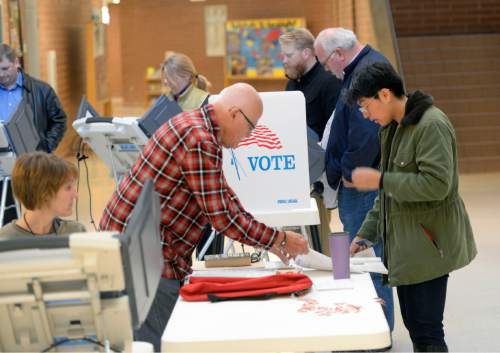This is an archived article that was published on sltrib.com in 2015, and information in the article may be outdated. It is provided only for personal research purposes and may not be reprinted.
Democrats will be allowed to let unaffiliated voters cast ballots in their June primaries, according to state elections officials, a reversal from the office's earlier interpretation of a federal judge's ruling.
U.S. District Judge David Nuffer struck down a provision in an election overhaul that would have forced parties to open their primaries to voters that do not align with any party. Democrats had traditionally allowed the state's 617,000 unaffiliated voters to participate in their primaries. Republicans did not.
The Utah Republican Party and the Constitution Party had challenged the law, arguing the "forced association" violated the group's First Amendment rights. Nuffer found in their favor.
But in his ruling issued Monday, Nuffer said that the ruling applied only to the plaintiffs — the Republican and Constitution parties — and not to other parties, meaning the Democrats still can open their primaries to unaffiliated voters.
"We're happy with the outcome and that's how we had originally interpreted Judge Nuffer's ruling," said Utah Democratic Party Chairman Peter Corroon. "Our goal is to increase voter participation in elections and this allows us to do so — even if the Republican Party doesn't choose to go down the same path."
The decision also means that Democratic candidates who want to get a spot on the primary ballot by gathering signatures will be able to collect those names from unaffiliated voters.
There are 135,000 registered Democrats in the state — about one-fifth the number of independent voters.
Republican and Constitution candidates will not be able to gather independent-voter signatures under the current law.
Without those unaffiliated voters, reaching the signature threshold needed to get on the primary ballot will be difficult for Republican candidates and impossible for Constitution Party office-seekers.
There are 640,000 registered Utah Republican voters and about 4,400 registered with the Constitution Party.
The GOP has also said it will challenge the candidacy of any hopeful who goes the signature route without going through the party convention, because, under the Republican rules, there is no recognized path for candidates to get on the primary ballot through signature-gathering.
Lt. Gov. Spencer Cox, the state's top elections official, said last week that he intends to recognize candidates from any party who gather enough signatures as qualified candidates, and he warned that the Republican Party's attempts to prevent signature-gathering candidates from being on the ballot may cost the party its status as a qualified political party.
That would mean that only signature-gathering candidates may end up on the primary ballot, and not those who go through the traditional party convention.
Both Cox and Utah Republican Party James Evans have said they will likely ask a judge to resolve the dispute.



